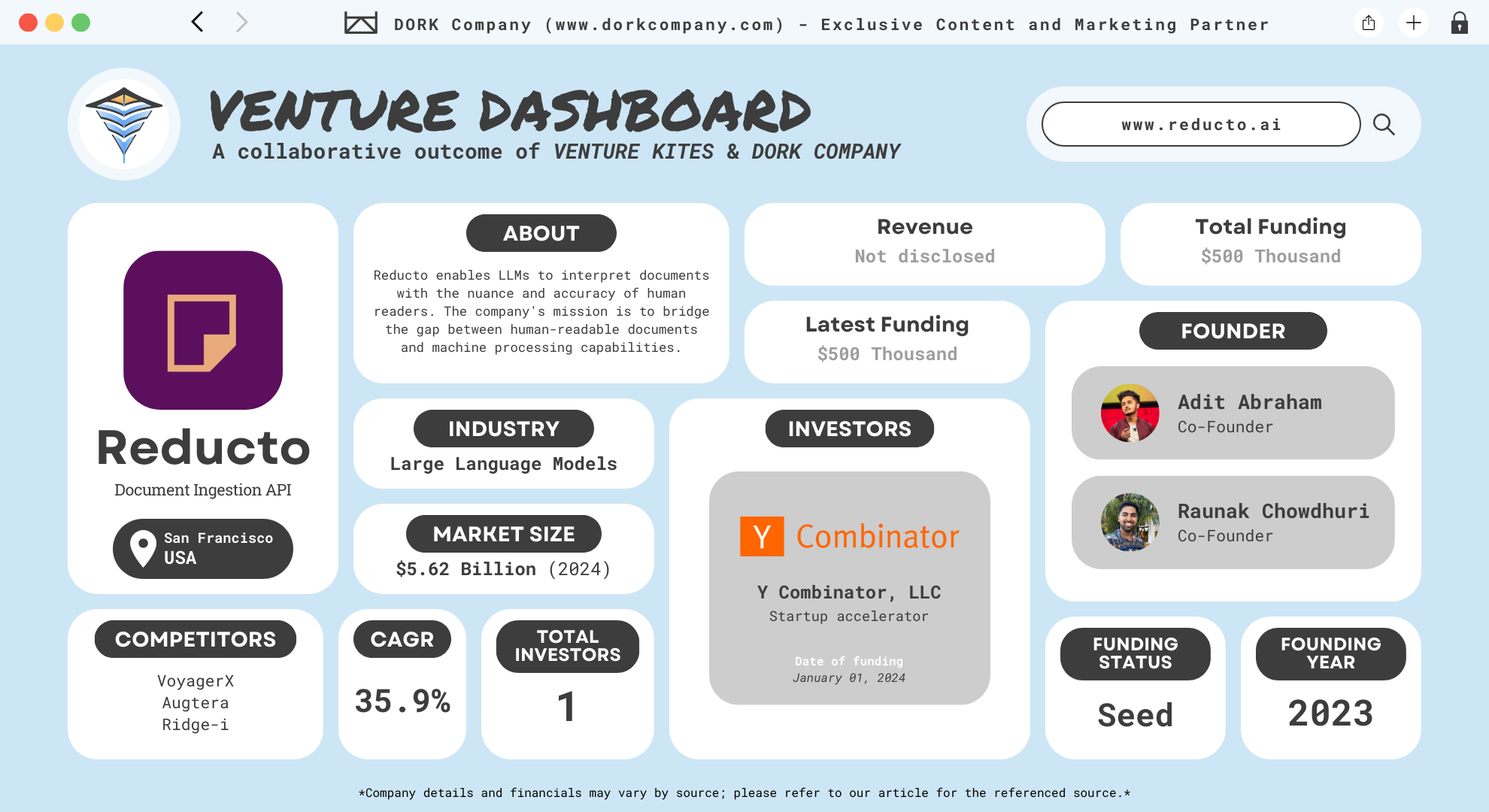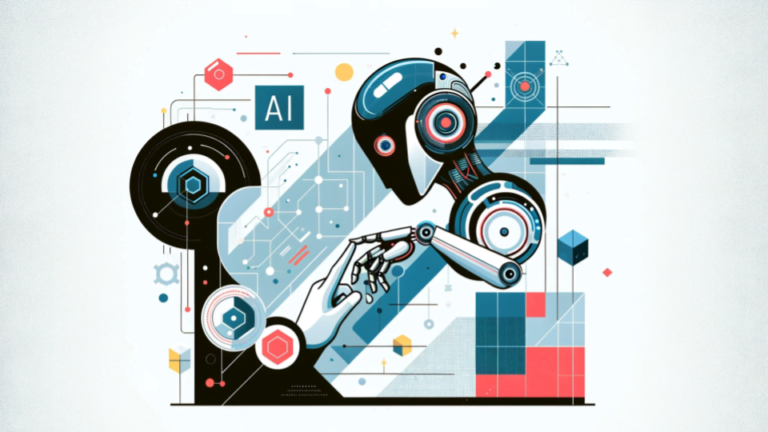Reducto : Redefining How We ‘Read’ Data, One Document at a Time!

Reducto, founded in 2023 by CEO Adit Abraham and CTO Raunak Chowdhuri, is a San Francisco-based startup specializing in data ingestion for Large Language Models (LLMs). Their primary offering is an API that transforms complex, unstructured documents—such as PDFs, Excel sheets, and PowerPoint presentations—into structured data formats suitable for LLMs and various workflows. Reducto
The company’s mission is to bridge the gap between human-readable documents and machine processing capabilities. By leveraging advanced vision models, Reducto enables LLMs to interpret documents with the nuance and accuracy of human readers. This technology addresses a significant challenge in the AI industry: the difficulty LLMs face when parsing data from intricate document formats, which often leads to errors and inefficiencies.
Reducto’s services cater to sectors that require precise data extraction from unstructured sources, including finance, healthcare, legal, and insurance industries. Their API integrates seamlessly with vector databases and embedding systems, enhancing the performance of Retrieval Augmented Generation (RAG) and process automation tasks.
By converting complex documents into structured data, Reducto empowers organizations to harness the full potential of LLMs, facilitating more accurate data analysis and decision-making processes. Their technology represents a pivotal advancement in making unstructured data accessible and actionable for AI applications.
Meet the Brains Behind the Bytes: Founders Bringing Data to Life
Reducto was founded by Adit Abraham and Raunak Chowdhuri, two accomplished technologists with deep expertise in artificial intelligence, machine learning, and document processing in 2023. Both founders have strong academic backgrounds in computer science and strive to bridge the gap between human-readable documents and machine processing capabilities, making unstructured data more accessible and actionable for AI applications.
Adit Abraham
Adit Abraham, a graduate of the Massachusetts Institute of Technology (MIT) with a degree in Computer Science, brings a wealth of experience from his time working at Google and his other ventures in the tech space. Before founding Reducto, Adit held a key role at Google, where he significantly contributed to YouTube’s search and ad products. In 2021, Adit co-founded Sidewalk, marking his entry into the entrepreneurial domain. Earlier in his career, he worked briefly with MIT Media Lab, where he conducted machine learning research. During this period, he also contributed to BlinkAI Technologies, leveraging Generative Adversarial Networks (GANs) to create synthetic data for machine learning models. Adit Abraham
Raunak Chowdhuri
Raunak Chowdhuri, also an MIT graduate with a background in Computer Science and Electrical Engineering, co-founded Reducto. Before Reducto, he served as the Chief Technology Officer (CTO) at Oloren AI, where he contributed significantly to the development of advanced machine learning tools. Raunak’s experience also spans roles as a researcher in MIT’s Driverless and Lincoln Laboratory projects, where he applied machine learning techniques to autonomous driving and environmental conservation through LIDAR predictions. Raunak Chowdhuri
Founding Story
In 2023, Adit and Raunak identified a significant challenge in the AI industry: the difficulty large language models (LLMs) face when processing complex, unstructured documents like PDFs and spreadsheets. They founded Reducto to address this issue by developing an API that converts such documents into structured data formats suitable for LLMs.
Their combined expertise in computer science and AI positioned them well to tackle this problem. By leveraging advanced vision models, they aimed to enable LLMs to interpret documents with human-like accuracy. This innovation has the potential to significantly impact industries that rely on precise data extraction from unstructured sources, such as finance, healthcare, legal, and insurance.
The Big Talkers: A Look at the Large Language Model Landscape
Large Language Models (LLMs) are advanced AI systems trained on extensive text data to understand and generate human-like language. They perform tasks such as text generation, translation, summarization, and sentiment analysis. The LLM market has experienced significant growth in recent years.
In 2024, the global LLM market was valued at approximately USD 5.62 billion. Projections indicate it will reach USD 35.43 billion by 2030, growing at a Compound Annual Growth Rate (CAGR) of 35.9% from 2024 to 2030. This rapid expansion is driven by increasing demand for Natural Language Processing (NLP) applications across various industries. Grand View Research
Applications and Industry Adoption
LLMs are utilized in diverse sectors:
- Customer Service: Enhancing chatbots and virtual assistants to provide more accurate and human-like responses.
- Content Generation: Automating the creation of articles, marketing materials, and reports.
- Healthcare: Assisting in medical research and patient care by analyzing vast amounts of medical literature.
- Finance: Analyzing financial reports and news articles to inform investment decisions.
The integration of LLMs into these industries aims to improve efficiency, reduce costs, and enhance user experiences.
Challenges and Considerations
Despite their benefits, LLMs present challenges:
- High Development Costs: Training LLMs requires substantial computational resources, leading to significant expenses.
- Data Privacy Concerns: Handling sensitive information necessitates robust security measures to protect user data.
- Ethical Issues: Ensuring LLMs do not perpetuate biases present in training data is crucial for fair and unbiased outputs.
Addressing these challenges is essential for the responsible deployment of LLMs. The LLM market is poised for continued growth, with advancements in AI research leading to more capable and efficient models. As industries increasingly adopt AI solutions, the demand for LLMs is expected to rise, driving further innovation and development in this field.
Mission ImPDFpossible: How Reducto Transforms Documents for AI
Mission
Reducto aims to bridge the gap between human-readable documents and machine processing capabilities. Their goal is to make unstructured data accessible and actionable for AI applications.
Vision
The company envisions AI systems that can interpret complex documents with human-like accuracy. They strive to enhance data ingestion processes, enabling more efficient and reliable AI-driven solutions.
Problems They Solve
Reducto addresses several challenges:
- Complex Document Layouts: Traditional data ingestion tools struggle with intricate formats like multi-column layouts, tables, and embedded images.
- Data Inconsistencies: Inaccurate data extraction leads to errors in AI outputs, affecting decision-making processes.
- Time-Consuming Manual Processing: Manual data extraction is labor-intensive and prone to errors, reducing operational efficiency.
Business Model
Reducto operates on a B2B model, offering an API that integrates with clients’ existing systems. Their services cater to industries like finance, healthcare, legal, and insurance, where accurate data extraction from unstructured documents is crucial. Clients can process documents through Reducto’s API, which converts them into structured data formats. This integration enhances the performance of LLMs and other AI applications, leading to more accurate analyses and insights.
Feature Fever: A Suite of Solutions for Data Dreamers
Reducto specializes in transforming complex, unstructured documents into structured data formats optimized for Large Language Models (LLMs). At the center of Reducto’s offerings is the Document Ingestion API, designed to process a variety of document types, including PDFs, Excel spreadsheets, and PowerPoint presentations. This API ensures high-accuracy extraction, even from documents with intricate layouts. Reducto API
Key Features
- High Accuracy Across Complex Layouts: The API employs advanced vision models to interpret documents similarly to human readers, ensuring precise extraction from tables, forms, images, and graphs.
- LLM-Ready Inputs: It optimizes document outputs for seamless integration into LLM workflows, enhancing performance in tasks like Retrieval Augmented Generation (RAG) and summarization.
- Structured Data Extraction: The API converts unstructured documents into structured data, enabling efficient analysis and processing.
- Security Measures: Reducto employs industry-leading security practices, offering zero data retention via their hosted API and options for self-hosting in private environments.
- Custom Schema Definitions: Users can define custom schemas for data extraction, allowing precise retrieval of relevant information.
- Intelligent Chunking: The API intelligently segments content, facilitating efficient processing by LLMs.
- Graph and Image Extraction: It extracts data from graphs and images, converting visual information into usable formats.
Behind the Bytes: The Tech Wizardry Powering Reducto
Reducto transforms complex, unstructured documents into structured data suitable for Large Language Models (LLMs). Their technology combines advanced vision models, machine learning, and natural language processing to achieve this.
What is an LLM?
Large Language Models (LLMs) are advanced AI systems trained on massive datasets of text to understand and generate human-like language. These models have billions of parameters, which are adjustable factors the model uses to learn and make decisions based on input data. These extensive models are capable of performing a wide range of language-related tasks, such as text generation, translation, summarization, and question-answering, often outperforming smaller models due to their vast training data and sophisticated architectures.
However, for LLMs to function well, they need clean, structured input data—a challenge that Reducto’s technology aims to solve by converting unstructured document data into LLM-friendly formats.
Intelligent Chunking
Intelligent Chunking is a technique Reducto uses to segment documents into smaller, meaningful sections based on their structure and content. When processing large documents, simply feeding all the text to an LLM can lead to poor performance and missed context. Intelligent chunking helps break down a document into parts that retain meaning individually, allowing LLMs to handle information more accurately.
For example, a legal document might be divided by clauses or sections, while a research paper could be chunked by paragraphs or topics. By processing each chunk separately, the LLM can maintain context and deliver more reliable and coherent results. This feature enhances the model’s capacity for tasks like summarization, question-answering, and analysis.
Natural Language Processing (NLP)
Natural Language Processing (NLP) involves the use of computational techniques to analyze and understand human language. NLP algorithms can interpret text, extract key details, detect sentiment, and even summarize content. NLP is central to Reducto’s operation as it helps the platform understand complex language structures and extract relevant data accurately.
Reducto’s use of NLP allows it to understand nuances within documents, like distinguishing between sections in a contract or recognizing headers and subheaders in a technical report. This understanding is essential for creating structured data, as it enables the API to identify the correct relationships between pieces of information and retain contextual integrity.
Advanced Vision Models
Vision models are AI systems that help machines interpret visual data, such as the layout and formatting of documents. Reducto employs vision models to “see” document components the way a human might. Vision models recognize tables, images, charts, and specific text layouts (like headers, footers, and columns) in PDFs, spreadsheets, or scanned documents.
These vision models work in tandem with NLP, allowing Reducto to extract and structure data accurately. For instance, a vision model might detect the presence of a table, while NLP extracts and labels the content within that table, ensuring precise, structured data extraction.
Custom Schema Definitions
Reducto provides a customizable schema definition feature, allowing users to define specific formats and structures for their extracted data. This customization ensures that the output data aligns precisely with the requirements of each business or industry. For example, a healthcare company may need structured data in a format compatible with Electronic Health Record (EHR) systems, while a finance firm might require information structured for analysis in a financial model. By allowing custom schema definitions, Reducto ensures that data extraction meets the specific needs of diverse clients, increasing its utility and ease of integration.
Together, these technologies enable Reducto to provide a robust, versatile solution for converting unstructured documents into structured, LLM-ready data. By leveraging advancements in LLMs, NLP, vision models, and security, Reducto facilitates the efficient ingestion and processing of complex documents, helping clients unlock new possibilities in AI-driven insights and automation.
Turning Heads and Winning Accolades: Reducto’s Market Impact
Reducto has made significant strides in the AI industry by addressing the challenges of processing complex, unstructured documents. Reducto’s technology has been embraced by leading AI teams and enterprises from startups to fortune 10 companies. Reducto’s innovative approach has garnered industry attention. They were part of Y Combinator’s Winter 2024 batch, highlighting their potential in the AI sector. Y Combinator
Reducto collaborates with leading AI companies to integrate its document ingestion API into various workflows and enable seamless processing of complex documents, enhancing the performance of Large Language Models (LLMs).
The company has formed partnerships with clients across industries such as finance, healthcare, legal, and insurance. By providing tailored solutions, Reducto addresses specific document processing challenges, improving data extraction accuracy and efficiency. Reducto has also secured investments from notable entities, including First Round Capital, BoxGroup, SVAngel, and Liquid2.
Funding the Future: A Peek into Reducto’s Financial Fuel
As of November 2024, Reducto has raised a total of $8.9 million in funding. This capital has been instrumental in advancing their technology and expanding their market presence.
In January 2024, Reducto secured $500,000 in seed funding from Y Combinator. This initial investment supported the development of their document ingestion API. Tracxn
By October 2024, Reducto raised an additional $8.4 million in a seed funding round led by First Round Capital. Other participants included Y Combinator, BoxGroup, SVAngel, and Liquid2. Notable angel investors such as Arash Ferdowsi (Dropbox) and Andrew Ofstad (Airtable) also contributed. Pitch Book
Rewriting the Rules of Data: Why Reducto is Worth Watching
Looking to supercharge your document processing? Reducto is reshaping how companies transform complex, unstructured documents into actionable data. Their technology deciphers dense PDFs, spreadsheets, and presentations, breaking them down into structured, LLM-ready formats.
At its core, Reducto tackles a major pain point in data ingestion. Many organizations struggle to extract reliable, structured data from unstructured sources. This problem costs time, increases labor, and risks data accuracy. Reducto’s API streamlines this, enabling AI systems to process data with minimal human intervention. Their advanced vision models, NLP, and intelligent chunking break down content precisely, making it easy for LLMs to digest and understand.
Reducto’s technology is crucial for industries like finance, legal, and healthcare, where reliable data extraction is essential. As AI technology evolves, the demand for accurate, accessible data will continue to rise.
Have a unique idea? The world of AI and data tech is full of opportunities. Now’s the time to take action on those ideas. Curious about other exciting startups and emerging tech? Check out more articles on Venture Kites for insights, inspiration, and industry trends.
At a Glance with DORK Company

Dive In with Venture Kites
Lessons From Reducto
Identify a Clear Market Pain Point
The Lesson & Why It Matters: Addressing a clear market need is crucial for startup success. Companies that solve real problems are more likely to gain traction and satisfy customer needs.
Implementation: Analyze your target market’s pain points. Conduct surveys, interviews, and market research to validate these issues.
How Reducto Implements It: Reducto identified a significant gap in data ingestion for LLMs, a pain point in industries requiring efficient document processing. Their API directly addresses this need by making complex documents easily readable by AI.
Prioritize Security in Data Handling
The Lesson & Why It Matters: Security builds trust, especially when dealing with sensitive data. Clients expect robust data privacy practices.
Implementation: Integrate advanced security protocols, like data encryption and private cloud options. Ensure compliance with industry regulations.
How Reducto Implements It: Reducto offers zero data retention in their hosted API, along with self-hosting options. This assures clients their data remains secure and private.
Adopt a Scalable Revenue Model
The Lesson & Why It Matters: Scalable revenue models, such as subscription tiers, allow startups to grow while meeting diverse client needs and budgets.
Implementation: Develop tiered subscription plans that cater to small, medium, and large-scale clients, with premium options for added support or services.
How Reducto Implements It: Reducto’s tiered pricing model accommodates various business sizes, with standard, growth, scale, and enterprise options.
Focus on a User-Friendly API Integration
The Lesson & Why It Matters: An easy-to-integrate API reduces onboarding time for clients and encourages adoption of your solution.
Implementation: Optimize your API for compatibility, clear documentation, and fast setup. Make the user experience seamless.
How Reducto Implements It: Reducto’s API integrates with client systems easily, allowing users to connect quickly and start processing documents with minimal friction.
Collaborate with Key Industry Players
The Lesson & Why It Matters: Collaborations expand your network and increase credibility. Partners can help you access new markets and expertise.
Implementation: Identify and approach key players in your industry. Aim to build partnerships that enhance your product or market reach.
How Reducto Implements It: Reducto collaborates with AI and tech leaders, ensuring that its product integrates seamlessly into various AI-driven workflows and reaches a larger audience.
Youtube Shorts
Author Details
Creative Head – Mrs. Shemi K Kandoth
Content By Dork Company
Art By Dork Company
Instagram Feed
X (Twitter) Feed
🚀 @reductoai is redefining AI workflows with its groundbreaking Document Ingestion API! 📄🤖
— Venture Kites (@VentureKites) December 2, 2024
💡 Here’s how they’re enabling Large Language Models (LLMs) to process complex documents with human-like precision. Let’s dive in 👇👇#AIInnovation #StartupJourney #Reducto












